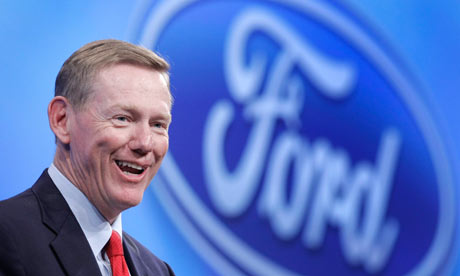DETROIT (TheStreet) — Let’s just call it
“Alan being Alan.”
Ford’s (F) ebullient CEO, Alan Mulally, is a master of the
warm-hearted gesture, of taking a little extra time to make people feel important, enthusiastic and ready to follow him
anywhere. At Ford, which he joined in 2006, that course has involved a journey from an economically distressed company,
habitually losing money, with debt rated seven levels below investment grade and every asset mortgaged, to emergence in 2011
as a profitable, glowing symbol of the revival of American manufacturing.

In the case of Oakland
A’s baseball player and potential Hall of Famer Manny Ramirez, the widely used phrase “Manny being Manny” refers to a legion
of incidents manifesting relentless obliviousness to his surroundings.
In the case of Oakland, Calif., native and
celebrity CEO Mulally, the phrase “Alan being Alan” connotes a string of anecdotes in which he engages with people, not only
those who are members of the world’s wealthy leadership class, but also with everybody else he encounters as he glides
through life, answering questions with a smile and a “you betcha.”
Many of those he encounters come away with stories.
Rebecca Lindland, director of research at HIS Global Insight, said that several years ago in a conversation with Mulally, she
mentioned that her mother was pleased that Ford was bringing cars with a European feel, such as the Focus, to the U.S. “He
said ‘What is your mother’s address?’ and the next thing I knew my parents had a handwritten letter from Alan and some
Ford goodies,” Lindland said. “Alan always has a willingness to learn one more thing about you.”
Steve Parks, lead
aerodynamics engineer for the Ford Fusion, recalled that
early last year he was at work in the Dearborn, Mich., design studio when Mulally entered with a group to have his picture
taken.
“I was working in my cubicle and I wanted to see what he looked like in person, so I looked at him, and he
looked at me, and he took a right turn and walked over and said ‘Hi, I’m Alan Mulally,'” Parks said. “I said ‘I know.
I’m Steve Parks. I’m working on aerodynamics for the Fusion.’ He said ‘aerodynamics, I love aerodynamics,’ and he gave
me a handshake and a hug. He was involved in aerodynamics at Boeing(BA) , and he started firing off questions, and we
were talking about incorporating concepts from Boeing.” The two men talked for 20 minutes.
“I have met many people,”
Parks said. “You can warm up to him and you can tell he is interested in the technologies and the people. He is a genuinely
warm person.”
In my own case, when I visited Dearborn last week for an interview, Mulally bounded into an outer room
to greet me, spent five minutes asking questions about my book on Brooklyn Dodgers outfielder Carl Furillo, then related how
he had journeyed from Kansas to Brooklyn as a boy to visit family members and to see Furillo and the Dodgers play in Ebbets
Field. His father had been born and raised in Brooklyn.
Asked whether he wants to show that “nice guys finish first,”
Mulally responded: “It is nice to be important, but it is more important to be nice.”
Of course, Mulally does not lead
successfully simply because he is a nice guy. Rather, his humanity inspires others to buy in. “The honor of leading,” he
said, involves “pulling everybody together around a compelling vision and around a strategy to implement that compelling
vision, and then pulling everybody together around a process to relentlessly implement that strategy.”
Joe Phillippi,
principal of AutoTrends Consulting, said that with his “‘aw shucks, gee whiz’ approach, never wearing a suit and always
wearing a blazer, Mulally is informal, but when he gives everybody their assignment, it comes along with accountability. If
he tells you to do something, you had better execute.”
One subject that fully engages Mulally is Ford history. During
the interview, he pulled out an original copy of the Jan. 24, 1925, edition of the Saturday Evening Post, expressed
his delight in having obtained it, and opened it to a two-page Ford ad/Henry Ford manifesto titled “Opening the Highways to
all Mankind.” A blown-up version is on Mulally’s wall.
“This is inspirational,” Mulally said. “Here’s Henry, he’s
wildly successful, when only the wealthy have vehicles, and he has a compelling vision,” and here he begins to read aloud
from the magazine. “Back of all the activities of the Ford Motor Company is this universal idea — a whole-hearted belief
that riding on the people’s highway should be within easy reach of all the people.” In that moment, Mulally, with Ford
insignias engraved on the cuffs of his sleeves, embodies a crusading idealism as he seems to re-channel the spirit of the
company’s founder.
It did not seem wholly inappropriate then to mention the periodic suggestions — perhaps said in
jest, perhaps not — that Mulally ought to run for president.
He responded, as he has before: “I am flattered people
would think of me that way, but I really think the best thing I can do for our country is to continue to contribute at Ford,
(pursuing) economic development, energy independence and our part of the solution for economic stability.”
At Ford, he
said: “We are fighting for the soul of America, with world-class manufacturing and U.S. competitiveness, so I’m honored to
serve Ford, and I think that’s the best thing I can do for our country right now.”
Here are six tenets that Mulally
considers important to leadership.
Have a Vision
“Leadership means pulling everybody together
around a compelling vision,” Mulally said. Of course his “One Ford” vision is by now well-known. To ensure that it remains
so, many Ford employees carry plastic cards on which the vision is carefully detailed. The card provides definitions of “one
team,” “one plan” and “one goal,” with the goal being: “An exciting, viable Ford delivering profitable growth for
all.”
Don’t Just Have a Vision: Have a Plan to Implement It
Vision alone is insufficient. You
must “pull everybody together around a strategy to implement that compelling vision,” Mulally said. “Have a really clear plan
for delivering it, one with really clear performance metrics so that everybody knows what they are. That way, in the areas
where you’re not on plan, everybody can work together. That’s about the relentless of implementation.”
The back of
the plastic “One Ford” cards lays out 16 “expected behaviors” for Ford employees. They include “ensure process discipline,”
“Have a ‘can do, find a way’ attitude and emotional resilience” and “set high expectations and inspire
others.”
When Problems Arise, Disclose Them
“When you run into an issue, trust the process,”
Mulally said. “Share them with everybody. Then, collectively, you’re going to find a way to fix them.
At a weekly
Thursday morning management meeting, Mulally said, everyone is encouraged to disclose whatever has gone wrong. “We celebrate
every issue that one might consider to be a problem,” he said. “When you’re off plan or something happens, we celebrate that
as a gem. Meaning: ‘I’m glad we know, thank you very much.’
“Facts and data,” Mulally said. “The data sets you
free.”
Involve People
This is where “Alan being Alan” comes into play.
Mulally “trusts
his people,” said Jim Farley, Ford group vice president for global marketing, sales and service. “He gives you responsibility
and lets you run.”
Said Mulally: “People are first. The main thing about (implementing) a compelling vision is to
include everybody — pull everybody together around the plan to implement a compelling vision.”
As an example, Mulally
cited an event from his days as CEO of Boeing Commercial Airplanes, where he presided over development of the 777. When the
first plane came off the assembly line, each employee who was involved with the project signed a banner that was attached to
the section they worked on.
Succession Plan
Mulally would not discuss when he might retire or
what he will do when he does, other than to say, “I will continue to serve, I’m sure.” But he willingly discussed the
necessity to have a succession plan. “The best is ahead of us,” he said. “And whenever I leave, the Ford team will continue
to keep Ford soaring.”
He shared an organizational chart, part of an investor day presentation, with photos of the
company’s top 17 executives — some of whom have recently announced their retirements. “This is a seamless succession plan,”
he said. “Everybody participating knows the vision and knows how Ford operates: That’s why it’s
seamless.”
Sense of History
Companies need to know where they have been, Mulally said. He has
worked at just two companies, both with rich histories he has embraced. Henry Ford and Boeing founder Bill Boeing each
created companies “with 100 years of dedication to safe and efficient transportation, quality and, of course, value,” he
said.
Reading the Henry Ford manifesto, Mulally comes to the final paragraph. “Here’s what makes me cry in the
morning,” he said, and then he reads aloud: “The Ford Motor Company views its station today less with pride in great
achievement than with the sincere and sober realization of new and larger opportunities for service to all
mankind.”
As if Alan Mulally has anything to cry about.
— Written by Ted Reed in Detroit





